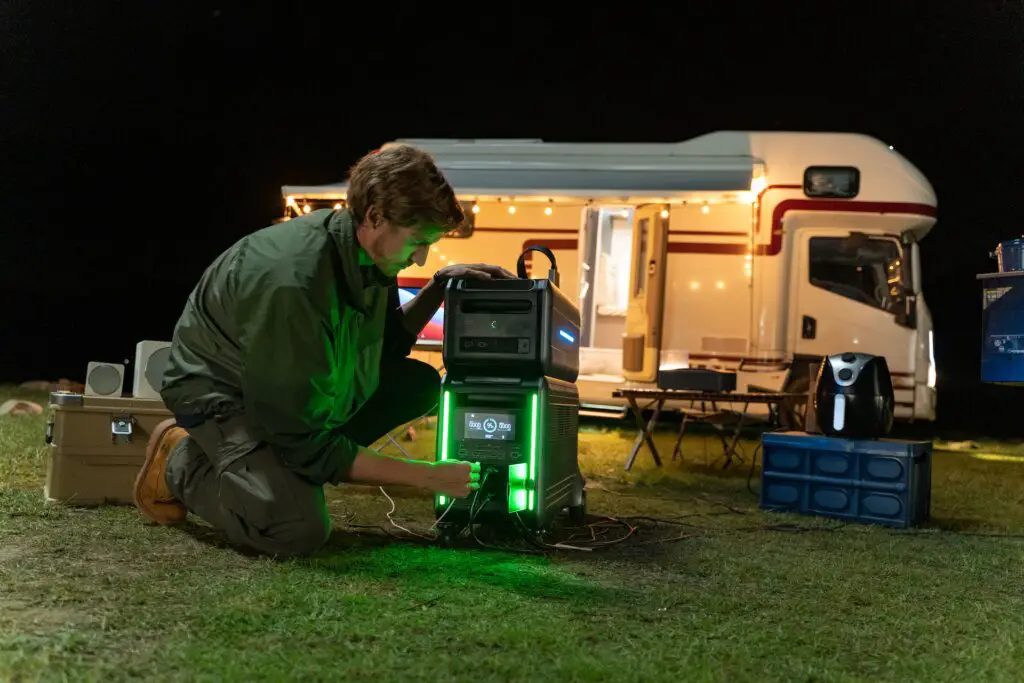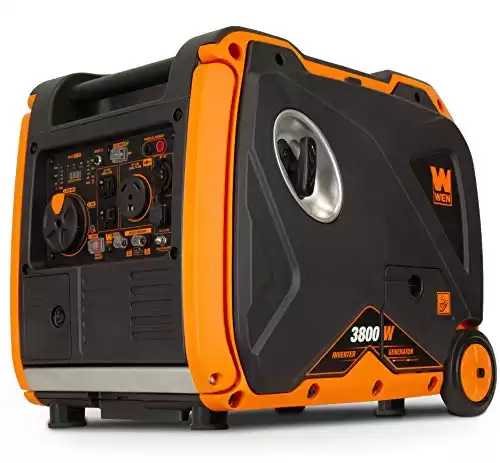Published Date: April 24, 2023
Last Updated on April 25, 2023 by Camper Front
Are you planning an adventure with your travel trailer but unsure about what size generator for travel trailer is the best to power your home away from home? Don’t worry; you’re not alone.
Choosing the correct generator size is crucial for a hassle-free trip, and we’ve got you covered with this comprehensive guide. This article covers everything to help you find the right generator size for your travel trailer, plus some recommendations to ease your decision.
Table of Contents
Different Types of Travel Trailer Generators
While traveling in RVs or other trailers, you’ll always need a reliable power source for multiple reasons. There’s nothing worse than being stuck in a remote location without electricity to run essential appliances and devices. That’s where a trusty travel trailer generator comes in! Let’s explore the different types of generators available, from portable to built-in, and help you decide which one is right for you.
Portable Generators: Your Mobile Power Solution
Portable generators are popular among RV owners because of their versatility and ease of use. These units can be easily moved and stored when not in use, making them perfect for those who value flexibility.
• Gas or Propane Generator: Which Fuel Is Right for You?
The fuel you provide to the generator can significantly affect your cost, so it is better to check which option is better for you: a gas or propane generator. Gasoline generators are often more powerful and have longer runtimes, while propane generators tend to be quieter and produce fewer emissions. Consider your travel habits and environmental preferences when making your choice.
• Watt Generator: Size Matters
Determining how many watts your generator needs to produce is crucial. To do this, add up the wattage requirements of all your appliances and devices, including your air conditioners and AC unit. Be sure to factor in starting and running wattage, as some appliances require more power to start up than to run continuously.
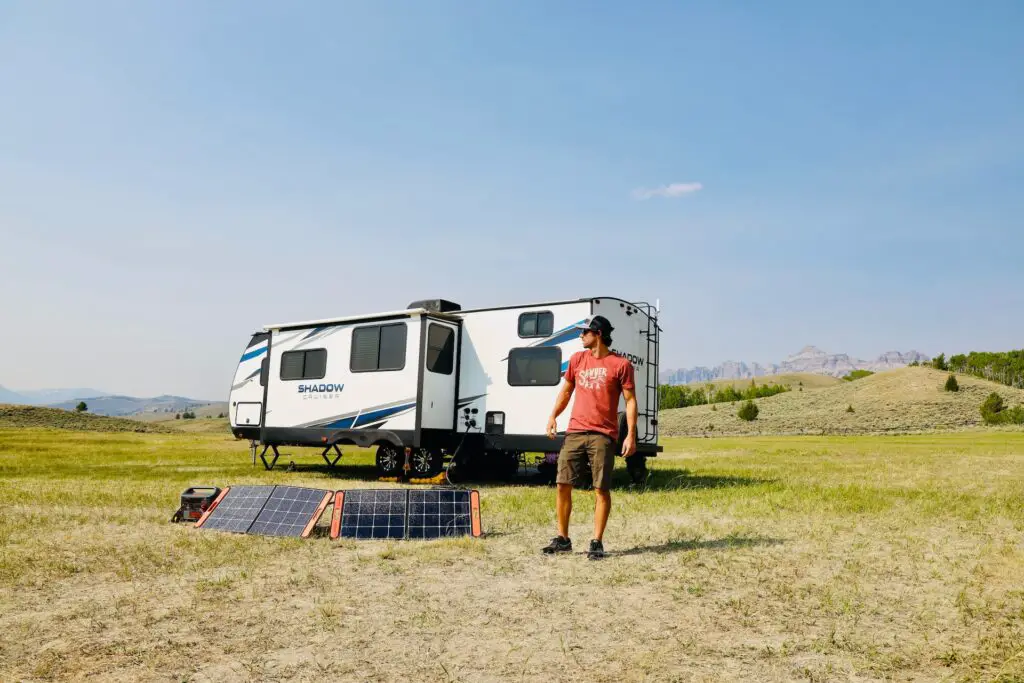
RV Generators: Built-in Convenience
Built-in generators, also known as RV generators, are designed to provide a seamless power experience. Installed directly into your travel trailer, these generators offer convenience and reliability that can’t be beat.
• Shore Power Compatibility
One of the main advantages of RV generators is their compatibility with shore power. When you’re parked at a campsite with electrical hookups, you can easily connect your trailer to the grid, saving fuel and reducing generator wear and tear.
• Sizing Your RV Generator
As with portable generators, you’ll need to determine how many watts your RV generator should produce. You can do that by checking what you want to use in your RV, like AC and electric stoves, and getting the most suitable generator.
Pros and Cons
Every generator has some benefits and some disadvantages that can ruin the overall experience. Here are some factors to consider when deciding which generator is right for you.
1. Noise Levels
Some generators are louder than others. It is better to opt for a generator with a low decibel rating so you can have a peaceful night while camping.
2. Maintenance Requirements
Generators require regular maintenance to perform optimally. Portable gas generators typically need more frequent attention than propane or built-in generators. You must pay more attention to choosing a generator that requires less maintenance.
3. Price and Affordability
Your budget will also play a role in your choice. Portable generators tend to be more affordable upfront, but built-in generators can offer long-term value and convenience.
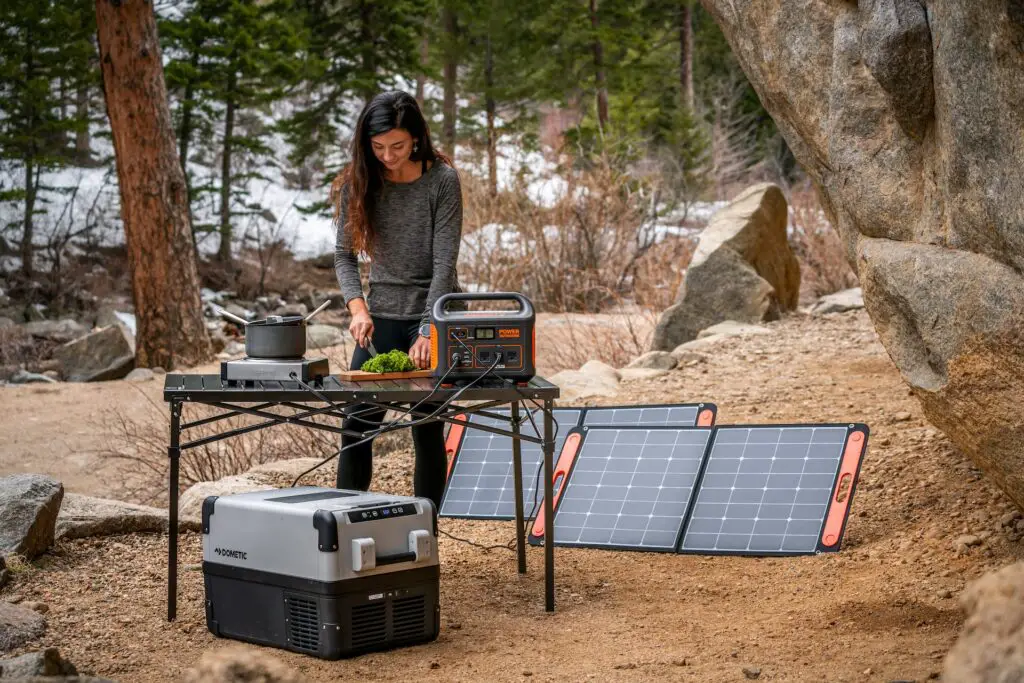
Generator Fuel Types
When selecting a generator, consider the fuel type that best suits your needs:
Gasoline
Most RV generators run on gasoline, which is readily available and easy to store.
Diesel
Such generators are fuel-efficient because diesel burns less and provides more power, but their price will be much higher.
Propane
If you want an extremely quiet and eco-friendly environment, choosing propane generators is better. Plus, most RVs have pre-installed propane tanks, saving you money on purchases and installments.
Dual Fuel
For versatility and convenience, choosing a generator that runs on gasoline and propane is better.
Assessing Your Travel Trailer’s Power Requirements
Before diving into the world of generators, it’s essential to determine how much power you’ll need. This section will guide you through calculating your travel trailer’s power requirements.
• Making a List of Appliances and Devices
Begin by listing all the appliances and devices you’ll be using in your travel trailer, such as:
- RV Air Conditioner
- RV Refrigerator
- Microwave
- TV
- Laptop
- Coffee maker
- AC units
Next, calculate the wattage requirements for each item. Don’t worry; every product has its wattage written on the manual it comes with.
• Determining Total Power Usage
Now, add up the wattage requirements of all your appliances and devices to determine your overall power needs. This will give you a better idea of the size of generator you’ll need to power everything.
• Calculating Starting and Running Wattage
Considering the difference between starting (surge) and running (rated), wattage is essential. Remember that some appliances, like your RV air conditioner, require more power to start. When selecting a generator, make sure to factor in both starting and running wattages.
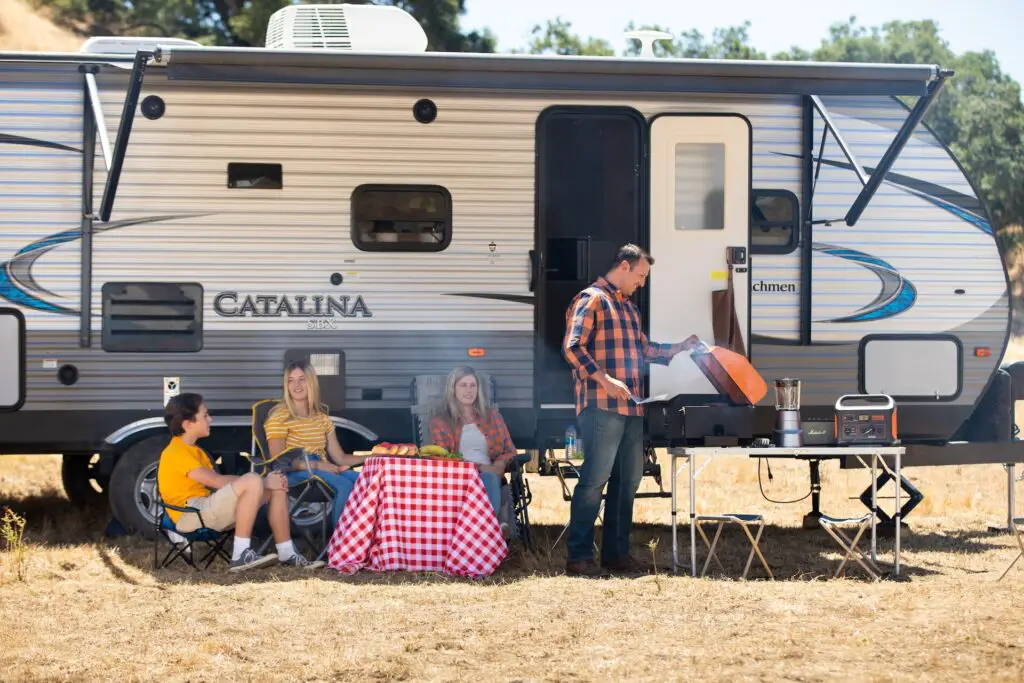
How Much Power Do I Need for My Travel Trailer?
Now, let’s walk you through determining your power requirements, choosing the right RV generator, and keeping your trailer running smoothly on the road.
• Evaluating Your Travel Trailer’s Power Needs
Checking how much power you need to run all the essentials on your travel trailer is better than choosing the right generator. Start by listing all the appliances and devices you plan to use while on the road, including air conditioners, heaters, refrigerators, and entertainment systems.
• Calculating Wattage Requirements
For each appliance or device on your list, find its wattage, which is typically listed in the user manual or on a label on the device. Don’t forget to consider both the starting (surge) wattage and running (rated) wattage, as many appliances require more power to start than they do to run continuously. Add all the wattage of each device to get the total power you need, so you can get the right generator and won’t have power fluctuation.
Understanding Generator Sizes
Now that you know your power requirements, it’s time to explore the different generator sizes and types available.
• Generator Capacity Ratings
Generators are typically rated by their wattage, which determines how much electricity they can produce. The larger the wattage rating, the more power a generator can provide. It is better to choose a slightly powerful generator so you can run all appliances effectively without power issues.
• Generator With the Right Wattage
Ensure the generator you choose can handle all your appliances’ starting and running wattage. For example, if your RV air conditioner has a starting wattage of 3,000 watts and a running wattage of 1,500 watts, you’ll need a generator with a capacity of at least 3,000 watts to handle the startup surge.
It’s always a good idea to select a generator with a slightly higher capacity than your calculated needs to ensure there’s room for any additional devices or appliances you may use in the future.
• Balancing Power Needs With Weight and Portability
Select a generator that meets your power requirements without being too heavy or cumbersome. Most portable and inverter generators are lighter and easier to move, so they are a popular choice for travel trailers. Remember, you’ll need to move and store the generator, so consider its weight and size when making your decision.
• Fuel Efficiency and Run Time Considerations
Evaluate fuel type and efficiency to maximize generator usage. Diesel-powered generators use less fuel than propane generators, but propane generators can be used with RV propane systems. Dual-fuel generators provide versatility in fuel options, allowing you to switch between gasoline and propane as needed.
Choosing the Perfect RV Generator
Now that you know your travel trailer’s power requirements, it’s time to find the perfect generator to meet those needs. Factors like generator size, fuel type, and wattage are crucial to check before finalizing your purchase.
1. Generator Size Matters
A portable generator should provide enough power to meet your trailer’s needs without taking up too much space or being too heavy to transport. To find the right watt generator for your trailer, look for one that can handle your appliances’ starting and running wattage. Keep in mind that built-in generators are also an option if you prefer a more permanent solution.
2. Gas or Propane Generator?
You have a few options regarding fuel type: gas, propane, or even dual-fuel generators that can run on both. Gas generators tend to be more common and are usually more affordable, while propane generators are cleaner-burning and often quieter. Consider your travel habits and budget when deciding which fuel type is best for you.
3. Don’t Forget About Shore Power
While a generator is essential for boondocking or camping off-grid, you may not always need it when staying at an RV park or campground. Many of these locations offer shore power, which allows you to plug your travel trailer into an electrical source and run your appliances without a generator. Be sure to check the wattage requirements of the shore power supply, as some may not be able to handle high-demand appliances like air conditioners or AC units.
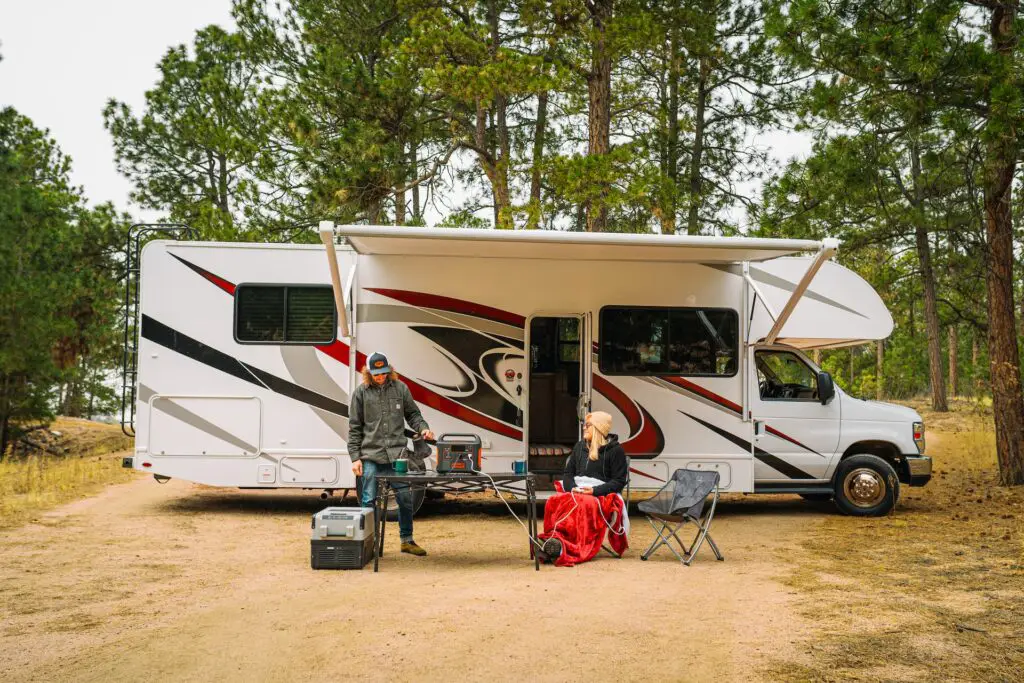
Noise Levels and Generator Placement
When selecting a generator for your travel trailer, it’s essential to consider noise levels and generator placement to ensure a comfortable and enjoyable experience.
• Understanding Noise Ratings
Generators produce noise, measured in decibels (dB). Inverter generators are generally quieter than conventional and portable generators. Keep in mind that every 10 dB increase represents a doubling of the noise level, so a generator rated at 70 dB will be twice as loud as one rated at 60 dB.
• Tips for Minimizing Generator Noise
Proper generator placement and sound-dampening techniques can help minimize noise.
- Position the generator as far away from your living area as possible.
- Place the generator on a stable, level surface to reduce vibration.
- Use a generator enclosure or baffle box to help absorb sound.
Maximizing the Efficiency of a Generator
Now that you have your generator figured out, let’s talk about some tips to make the most of your power supply and keep your travel trailer comfortable.
• Prioritize Appliance Usage
To conserve power and prevent your generator from overloading, prioritize the use of your appliances. For example, if you’re running your air conditioner, consider turning off other high-wattage devices like microwaves or hairdryers.
• Keep Your Generator Maintained
Regular maintenance is essential to keep your generator running smoothly and efficiently. Check the oil and air filters, and follow the manufacturer’s recommended maintenance schedule to ensure optimal performance.
Safety Tips and Proper Generator Use
To ensure a safe and enjoyable trip, follow these general safety guidelines and maintenance tips for your generator:
General Safety Guidelines
- Always use your generator outdoors and away from windows, doors, and vents to prevent carbon monoxide buildup.
- Store fuel in approved containers and away from heat sources or open flames.
- Turn off the generator and let it cool before refueling to avoid spills and potential fires.
Maintaining Your Generator
- Perform routine maintenance to ensure optimal performance and longevity:
- Check and change the oil regularly, following the manufacturer’s recommendations.
- Inspect and replace air filters as needed.
- Keep the generator clean and free of debris.
The Pros and Cons of Generators for Travel Trailers
Traveling with a generator for your travel trailer can provide a sense of freedom and independence, allowing you to venture off the beaten path without sacrificing comfort. But you need to find the right generator to make sure you never have power problems in your trailer.
Let’s talk about the pros and cons of using a portable generator for your travel trailer. We’ll look at things like the type of generator, how much power you need, and more.
Advantages of Using a Generator for Your Travel Trailer
• Portable Power on the Go
A portable generator is convenient for powering your travel trailer when shore power is unavailable. You can carry them anywhere, and they have enough power to run essential appliances and devices, such as air conditioners, AC units, refrigerators, and more. Investing in a portable generator gives you the freedom to camp in more remote locations without worrying about access to electricity.
• The Right Generator for Your Needs
Knowing the power in watts required for your devices is important before choosing a travel trailer generator. By calculating the total wattage of your appliances and devices, you can determine the size of generator you need. Some RVs have a built-in generator, while for others, you’ll need to create some space. A generator matching your power needs ensures you can enjoy your travel trailer’s comforts without overloading your electrical system.
• Gas or Propane Options
One good thing about using a generator for your travel trailer is that you can run it on different types of fuel. Gas and propane are the most common, and each has its own pros and cons. Gas generators are often more powerful and have a longer runtime, while propane generators are quieter and produce fewer emissions. By weighing the pros and cons of each fuel type, you can select the generator that best suits your needs and preferences.
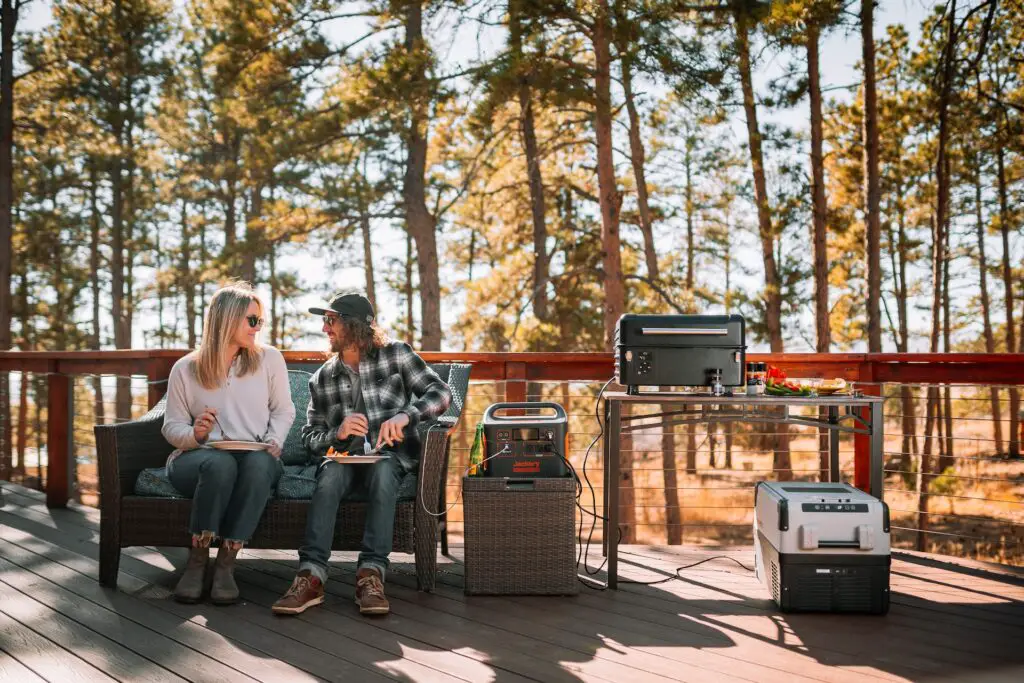
Disadvantages of Using a Generator for Your Travel Trailer
• Noise Levels
One of the primary drawbacks of using a generator for your travel trailer is the noise it can produce. While some generators are designed to operate more quietly, others can be quite loud and disruptive, especially when running appliances like air conditioners. It’s important to think about how loud the generator is and look into ways to reduce noise, like using materials that absorb sound or choosing a generator with a lower decibel rating.
• Maintenance and Fuel Storage
Generators require regular maintenance to ensure they operate efficiently and have a long lifespan. This may involve changing oil, cleaning filters, and inspecting components for wear and tear. Also, storing your generator’s fuel can pose potential safety hazards, such as leaks or spills. If you choose to use a generator for your travel trailer, it’s crucial to familiarize yourself with proper maintenance and fuel storage practices to ensure the safety and longevity of your generator.
• Environmental Impact
While generators provide a convenient power source for your travel trailer, they do come with some environmental considerations. Gas generators, in particular, produce emissions that can contribute to air pollution. If you’re concerned about your environmental footprint, you may want to consider opting for a propane generator or exploring alternative power sources, such as solar panels or wind turbines.
Top Generators for Travel Trailer
Before we share more details about travel trailer generators, here are the best portable generators for your travel trailers.
WEN Super Quiet 3800-Watt Generator
The WEN 56380i 3800-Watt Portable Inverter Generator offers an impressive combination of power, portability, and versatility. With its advanced features, this RV generator is designed to meet all your power needs without breaking the bank.
• Power and Performance
One of the key factors in determining what generator you need is wattage. With a 3800-watt output, the WEN 56380i can comfortably power multiple appliances, including air conditioners, refrigerators, and even an AC unit.
• Running on Gas or Propane
Fuel choice is another important consideration when choosing a generator. The WEN 56380i is a versatile gas or propane generator, allowing you to choose the fuel type that best suits your needs.
• Portability and Ease of Use
Weighing in at 99.2 pounds, the WEN 56380i is a relatively lightweight and compact portable generator. The built-in wheels and collapsible handle make it easy to move around your campsite, while its user-friendly control panel simplifies operation.
• Quiet Operation
Noise can be a concern when using a generator, especially in close quarters. The WEN 56380i boasts a noise level of 57 decibels at a 25% load, making it quieter than many built-in generators.
• Efficient and Eco-Friendly
The WEN 56380i features an eco-mode that adjusts fuel consumption based on the connected load. This helps optimize fuel efficiency and extend runtime, ensuring you get the most out of your generator. Additionally, its low-oil and low-fuel automatic shutdown protects the engine, prolonging its lifespan.
WEN Super Quiet 3800-Watt Generator
The WEN 56380i 3800-Watt Portable Inverter Generator offers an impressive combination of power, portability, and versatility. With its advanced features, this RV generator is designed to meet all your power needs without breaking the bank.
• Power Output and Efficiency
The Champion 4500-Watt Inverter Generator delivers a remarkable 4500 starting watts and 3500 running watts, enough to power multiple appliances and devices simultaneously. Its fuel efficiency is also impressive, with up to 14 hours of run time on a single tank of gasoline.
• Quiet Operation for a Peaceful Experience
One of our favorite aspects of this generator is its relatively quiet operation. At 61 dBA, it’s not completely silent, but it’s significantly quieter than many other generators in its class, allowing for a more peaceful camping experience.
• Easy Assembly and Setup
The clear instructions and minimal assembly required to make getting the generator up and running a breeze.
Frequently Asked Questions(FAQs)
1. What is the most suitable generator size for my travel trailer?
Grab the list of all the appliances you want to run on your travel trailer to know the right generator size. Calculate the starting (surge) and running (rated) wattage of each item and add them up. Choose a generator with enough capacity to handle your combined appliances’ starting and running wattage. Consider weight, portability, and fuel efficiency when selecting the right generator.
2. What helps remove generator noise when camping?
Generator noise levels are essential for your comfort and those around you. Getting a generator with low decibel ratings is always a better choice. Also, you can place the generator away from sleeping areas to minimize noise and use sound-dampening techniques like generator enclosures or barriers. Always follow safety guidelines for proper generator placement, ensuring adequate ventilation and keeping it away from flammable materials.
Final Verdict – Choose the Perfect Travel Generator Size
Getting the right size generator for your travel trailer is one of the most important things you can do to make sure your trip is comfortable and safe. Calculate your trailer’s total power needs, consider generator types and fuel efficiency, and account for noise levels and safety.
By taking the time to find the perfect generator, you’ll not only power your appliances and devices with ease but also create an enjoyable and memorable travel experience for everyone.

